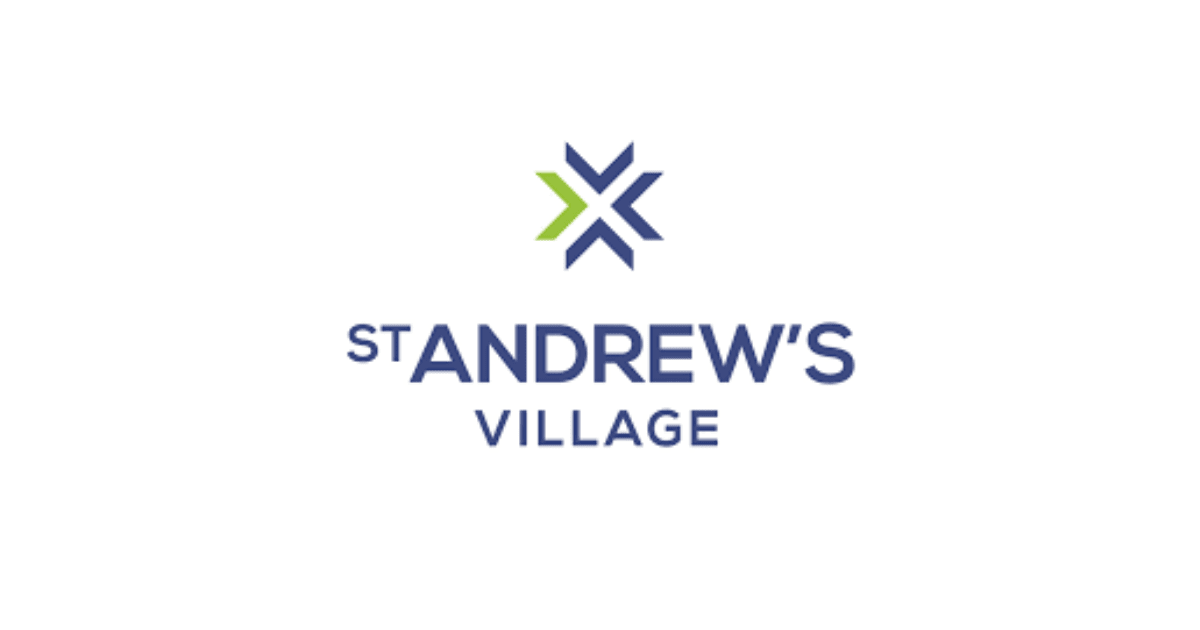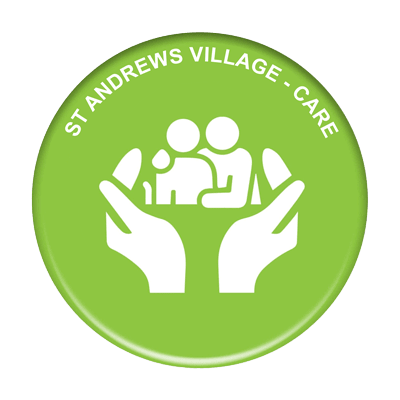Communications Centre
Welcome to the St Andrew's Village Communications Centre.
How can we help you today?
Here you will find our feedback information portal along with key contacts for you to use should you wish to share your thoughts, ideas or concerns with us.
FEEDBACK FORM - General, Compliments, Concerns or Complaints
Please submit your feedback here. You can also contact us directly at any of the contact details found at the bottom of this page.

EXCELLENCE OF CARE & SERVICE NOMINATION FORM
We love to celebrate the wonderfule work of our St Andrew's Village team. If you have had an experience that you believe should be recognised let us know below.

WANT TO BECOME A VOLUNTEER AT ST ANDREW'S VILLAGE?
Volunteers contribute their services with the aim of assisting St Andrew’s Village to achieve its objectives. Should a family member or someone you know be interested in providing volunteer services, please fill out the form below and we will be in touch.
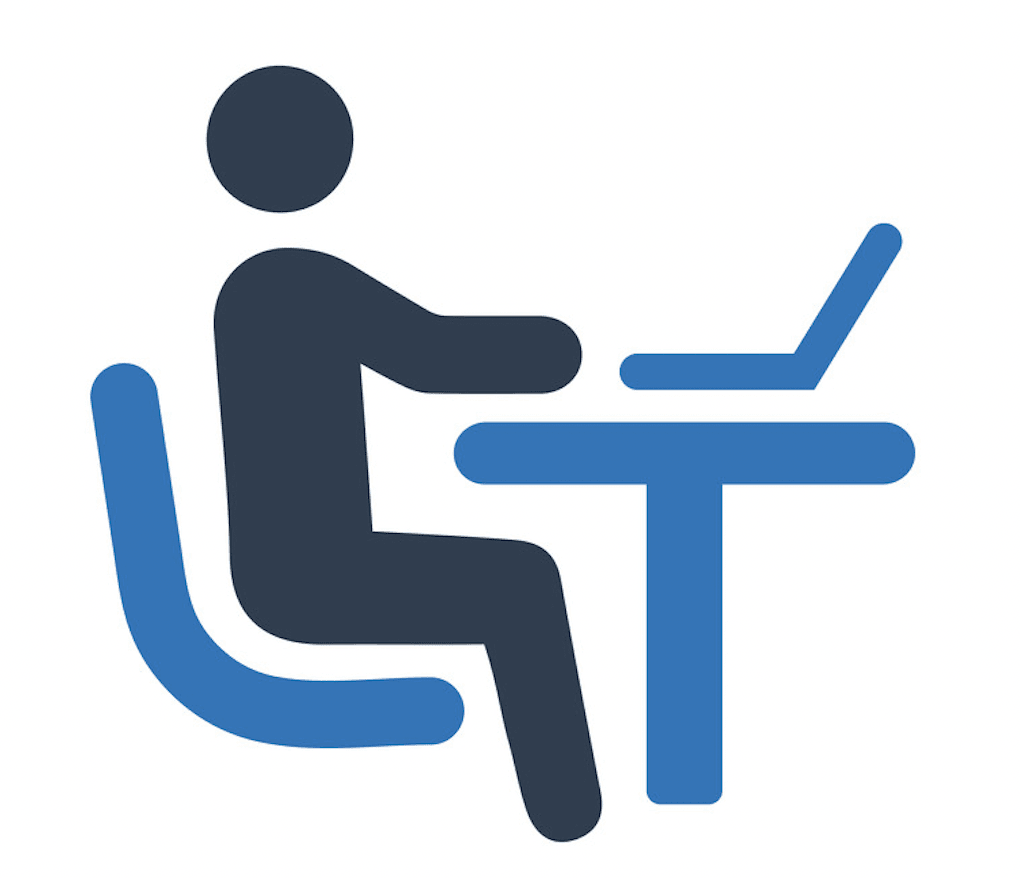
KEY STAFF CONTACTS
Director of Care
Carmen Stadler-Hanekom
e-mail Carmen@sav.co.nz
Phone 09 585 4020 ext. 210
Mobile 027 773 6778
St Andrew’s Village Admissions Manager
e-mail Admissions@sav.co.nz
Phone 09 585 4020 ext. 223
Mobile 021 0226 3418
Opening Hours are Monday to Friday, 8:30 am to 5:00 pm Phone 09 585 4020.
The office and reception desk is located inside the front entrance of the main Care Centre building.
Administration staff are available to assist residents and family/Whanau with queries regarding accounts, trust accounts and general administration matters. Outside of Business hours, the telephone system runs on “night service”.
Key Information
Key Information
The office and reception desk is located inside the front entrance of the main Care Centre building.
Administration staff are available to assist residents and family/Whanau with queries regarding accounts, trust accounts and general administration matters. Outside of Business hours, the telephone system runs on “night service”.
Opening Hours are Monday to Friday, 8:30 am to 5:00 pm Phone 09 585 4020.
Directory
Director of Care – Carmen Stadler-Hanekom
e-mail Carmen@sav.co.nz
Phone 09 585 4020 ext. 210
Mobile 027 773 6778
St Andrew’s Village Admissions Manager
e-mail Admissions@sav.co.nz
Phone 09 585 4020 ext. 223
Mobile 021 0226 3418
Nationwide Health & Disability Commissioner’s Consumer Advocacy Service
ph: 0800 555 050
Public Trust ph: 0800 371 471
Guardian Trust ph: 0800 300 299
Aged Concern ph: 0800 652 105
New Zealand Herald. ph: 0800 100 888
Spiritual & Religious Matters
Residents are encouraged to continue their own spiritual, and religious activities where possible. Please make sure we are aware of your preferences or requirements.
The Chapel area in “The Street” is open 24 hours a day for the use of any resident and their family/friends. Any senior staff member can arrange a visit for a resident or family member. Interdenominational services are held weekly.
Noticeboards
These are located opposite Reception, outside the Activities room and opposite each Nurse’s Station.
Courtyard
The courtyard is available to all residents, families & Whanau. A coffee machine is located for use free of charge.
The Terraces
The Terraces restaurant is available to all residents, families and whanau. To make a booking call 09 926 7973
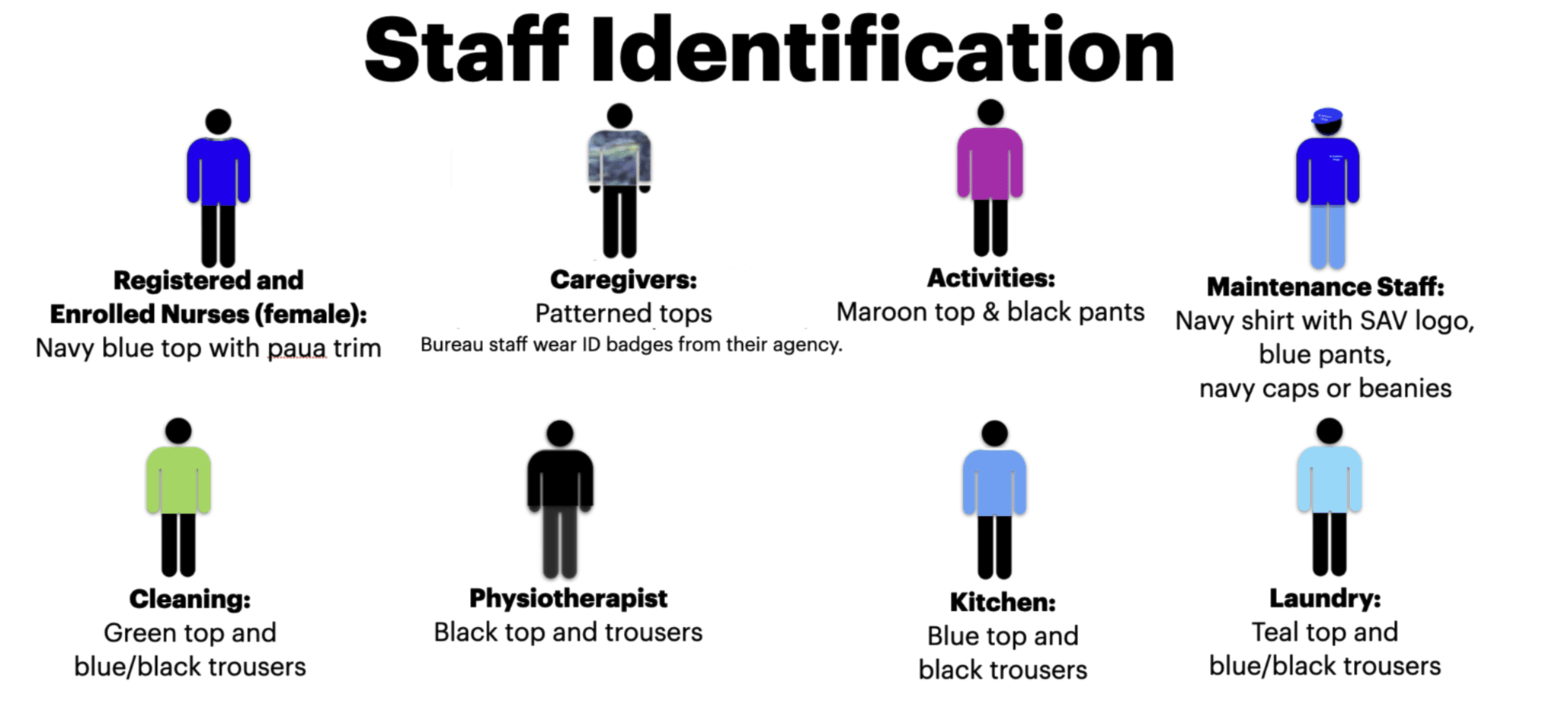
Safety and Rules
Find information regarding safety and rules for residents, family/whanau and staff of St Andrew's Village.
You can browse all the sections of information using the navigation in the green bar at the top and bottom of this page.
Residents’ Responsibilities
Residents’ responsibilities are to respect the privacy, dignity and cultural diversity of other residents and to treat staff and other residents with respect.
Electricity and Electrical Goods
On admission, the Maintenance staff will check all your electrical equipment to ascertain if it is safe for use.
They will also conduct an annual inspection of equipment.
Mobility Vouchers
Land Transport and Auckland Regional Council issue Mobility vouchers through their agent Age Concern You can contact them at 09 820 0184
On request, Age Concern will send an Assessor to visit St Andrew’s Village residents. They will assist in form completion and take an ID photo.
The cost is $60 for an unlimited membership.
More information:
Taking Residents out on Day Visits
Connecting with family, friends and community is vital for residents’ satisfaction and well-being, and at St Andrew’s Village, we do what we can to make it easy for you to take your family member or friend out on visits.
Mobility & Manoeuvres while on Visits.
Generally, staff are requested not to physically assist with transferring residents into private cars, as it implies the visitor is not able to do it, and therefore, poses a problem at the other end of the journey. In special circumstances, staff can assist if the nurse judges it as safe.
Staff need to make sure that appropriate safety measures are in place for residents, staff and you, particularly if any lifting is needed or if the resident has particular care or medication needs.
Process for family or friends to follow:
Please discuss your plan to take a resident out with the RN or Nurse Manager before confirming it with the resident.
You will also need to assure staff that you will be able to meet any mobility or care requirements that the resident may have while out on the visit.
And, of course, staff will need to know that the resident or their representative consents to the outing.
Process for staff to follow:
You will need to ensure there is agreement from the resident or whoever is legally able to give this agreement on their behalf. This is in addition to the general consent form signed as part of the admission process.
If the resident requires specific care or medication during the time of the proposed visit, please ensure that the person responsible for the resident is fully informed and competent to administer any necessary care.
Advocacy
St Andrew’s Village expects staff to advocate on behalf of residents. We encourage your participation with our Clinical Managers to determine how your or a family member’s health and welfare are managed at St Andrew’s Village.
However, should you wish to seek external help and guidance, or feel you are not being listened to; you can independently contact one of the following agencies:
Age Concern Auckland – 09 820 0184
Nationwide Health & Disability Commissioner’s Consumer Advocacy Service – 0800 555 050
Complaints
We know it is not easy for people to complain about services but please be assured that we investigate all complaints carefully and respectfully. Your feedback and suggestions provide opportunities for us to improve our service or correct any mistakes we may have made.
Please feel free to discuss your concerns with your Nurse Manager in the first instance or a senior staff member if you are not happy with any aspect of care or service.
Complaint and Feedback forms are also available online, at Reception and on noticeboards opposite every Nurses Station. You can complete this yourself or ask a staff member to do so for you.
The completed form is then placed in the red letterbox on “The Street” or handed in at reception. It can also be given directly to our the Director of Care – Carmen Stadler-Hanekom.
You can contact her directly at 09 585 4020 ext. 210 or via mobile at 027 773 6778.
We aim to resolve complaints within 21 days.
If you need support to make a complaint, or if your problems cannot be resolved satisfactorily, free independent Advocacy Services are available.
Hip Protectors
Hip protectors are protective shields over the hips that absorb or dissipate forces applied to the hips in the event of a fall. The shield is positioned over the ball and socket joint of the hip. There is a range of different types of hip protectors.
How do they work?
Hip protectors act like an airbag covering the ball and socket joint of the hip. When a fall occurs, the impact of the fall is radiated away from the bones, and absorbed by the surrounding tissues. Radiating and shunting the impact of a fall away from the hip joint, reduces the risk of a hip fracture.
What is the cost?
Each garment costs approximately $100.00 including delivery (paid for by resident/family).
We can order them on your behalf after consulting with you.
Where can I find out more information?
Should you require further information about hip protectors and their use, please discuss this with your Registered Nurse or Nurse Manager. Please also see the supplier’s website
Smoking
St Andrew’s Village complies with the New Zealand Smoke-Free policy; therefore, a prohibition ban is in place for smoking inside our buildings and in public areas. Please see a staff member about the allocated smoking area if you wish to smoke.
Alcohol & illicit Drugs
You are welcome to bring your own alcohol. St Andrew’s Village respects the rights of other residents and staff, so we request that you refrain from excessive drinking and abide by our restrictions i.e. Alcohol stored at the Nurses’ station.
Please remember to take into account any medical condition you may have before consuming alcohol.
St Andrew’s Village abides by the law prohibiting the use or storage of illicit or illegal drugs.
Fire
In the event of the fire alarm sounding, please follow the instructions of the staff in the area you are located.
More information:
Taking Residents out on Day Visits
Connecting with family, friends and community is vital for residents’ satisfaction and well-being, and at St Andrew’s Village, we do what we can to make it easy for you to take your family member or friend out on visits.
Mobility & Manoeuvres while on Visits.
Generally, staff are requested not to physically assist with transferring residents into private cars, as it implies the visitor is not able to do it, and therefore, poses a problem at the other end of the journey. In special circumstances, staff can assist if the nurse judges it as safe.
Staff need to make sure that appropriate safety measures are in place for residents, staff and you, particularly if any lifting is needed or if the resident has particular care or medication needs.
Process for family or friends to follow:
Please discuss your plan to take a resident out with the RN or Nurse Manager before confirming it with the resident.
You will also need to assure staff that you will be able to meet any mobility or care requirements that the resident may have while out on the visit.
And, of course, staff will need to know that the resident or their representative consents to the outing.
Process for staff to follow:
You will need to ensure there is agreement from the resident or whoever is legally able to give this agreement on their behalf. This is in addition to the general consent form signed as part of the admission process.
If the resident requires specific care or medication during the time of the proposed visit, please ensure that the person responsible for the resident is fully informed and competent to administer any necessary care.
Advocacy
St Andrew’s Village expects staff to advocate on behalf of residents. We encourage your participation with our Clinical Managers to determine how your or a family member’s health and welfare are managed at St Andrew’s Village.
However, should you wish to seek external help and guidance, or feel you are not being listened to; you can independently contact one of the following agencies:
Age Concern Auckland – 09 820 0184
Nationwide Health & Disability Commissioner’s Consumer Advocacy Service – 0800 555 050
Complaints
We know it is not easy for people to complain about services but please be assured that we investigate all complaints carefully and respectfully. Your feedback and suggestions provide opportunities for us to improve our service or correct any mistakes we may have made.
Please feel free to discuss your concerns with your Nurse Manager in the first instance or a senior staff member if you are not happy with any aspect of care or service.
Complaint and Feedback forms are also available online, at Reception and on noticeboards opposite every Nurses Station. You can complete this yourself or ask a staff member to do so for you.
The completed form is then placed in the red letterbox on “The Street” or handed in at reception. It can also be given directly to our the Director of Care – Carmen Stadler-Hanekom.
You can contact her directly at 09 585 4020 ext. 210 or via mobile at 027 773 6778.
We aim to resolve complaints within 21 days.
If you need support to make a complaint, or if your problems cannot be resolved satisfactorily, free independent Advocacy Services are available.
Hip Protectors
Hip protectors are protective shields over the hips that absorb or dissipate forces applied to the hips in the event of a fall. The shield is positioned over the ball and socket joint of the hip. There is a range of different types of hip protectors.
How do they work?
Hip protectors act like an airbag covering the ball and socket joint of the hip. When a fall occurs, the impact of the fall is radiated away from the bones, and absorbed by the surrounding tissues. Radiating and shunting the impact of a fall away from the hip joint, reduces the risk of a hip fracture.
What is the cost?
Each garment costs approximately $100.00 including delivery (paid for by resident/family).
We can order them on your behalf after consulting with you.
Where can I find out more information?
Should you require further information about hip protectors and their use, please discuss this with your Registered Nurse or Nurse Manager. Please also see the supplier’s website
Smoking
St Andrew’s Village complies with the New Zealand Smoke-Free policy; therefore, a prohibition ban is in place for smoking inside our buildings and in public areas. Please see a staff member about the allocated smoking area if you wish to smoke.
Alcohol & illicit Drugs
You are welcome to bring your own alcohol. St Andrew’s Village respects the rights of other residents and staff, so we request that you refrain from excessive drinking and abide by our restrictions i.e. Alcohol stored at the Nurses’ station.
Please remember to take into account any medical condition you may have before consuming alcohol.
St Andrew’s Village abides by the law prohibiting the use or storage of illicit or illegal drugs.
Fire
In the event of the fire alarm sounding, please follow the instructions of the staff in the area you are located.
Services
Find information regarding services provided to the residents of St Andrew's Village.
You can browse all the sections of information using the navigation in the green bar at the top and bottom of this page.
Weekly Mail delivery to your House. The address for your mail is:
St Andrew’s Village Care Centre
Room # (Your room number)
207 Riddell Road
Glendowie
Auckland 1071
Pharmacy Service
St Andrew’s Village has a contracted pharmacy to supply medications. The pharmacy will provide urgent essential medication; general prescriptions however require 24 hours’ notice.
It is important to inform St Andrew’s Village’s contracted Pharmacy with details of your former pharmacy in case exemptions for charges are in place.
St Andrew’s Village covers the cost for all Pharmac listed medications only. The resident is responsible for the payment of drugs not on the Pharmac list.
Physiotherapy (PT)
We have a large, well-equipped PT Department located in “The Street”. Treatment is provided by a doctor or Senior Nurse’s referral only, for a stated specific length of time.
Our Registered Physiotherapist carries out assessments, evaluations and treatment plans on Monday, Wednesday and Thursday mornings
Physiotherapy Assistants work Monday to Friday, 8:30 am -2:00 pm
Dental Service
A mobile dentist (Elder Dental) runs clinics at St Andrew’s Village when 6-8 residents make a booking. Residents and/or next of kin are responsible for making the appointment and for the associated costs.
Alternatively, you can make an appointment with a local dentist.
St Andrew’s Village can assist with transport arrangements.
More information:
Doctors and Nurse Practitioner
Usually, residents at St Andrew’s Village have their medical care overseen by one of the doctors or the Nurse Practitioner contracted to St Andrew’s Village.
However, residents may request to retain their own doctor. St Andrew’s Village will contact your physician for authorisation and will advise the outcome.
You will be registered with a St Andrew’s Village doctor should your doctor decline continued care.
In addition, St Andrew’s Village has a contract with a 24/7 GP telephone service for residents who are under our doctors’ care.
St. Andrew’s Village contracts General Practitioners (GPs) and Nurse Practitioner to work as part of our multi-disciplinary team.
They provide comprehensive, evidence-based medical care in a resident-centred manner, referencing current gerontological, palliative medicine best practices, and SAV policies.
Who provides the medical service?
We contract local GPs, most of whom have their own general practice, and have our own Nurse Practitioner (NP).
Can I continue to use my previous GP instead of a St Andrew’s Village GP/NP?
Yes, you can continue to use your current GP, but they must be happy to visit you and work under our protocols, including providing emergency cover.
Also, you can change (at any time) to a different SAV GP or to our NP, subject to their availability and consent to accept you.
When are GPs/NP available at SAV?
They are rostered, and there is at least one (1) GP visiting each weekday. They see their allocated residents, as well as other acutely unwell residents. (Assigned GPs don’t visit every day, the NP is here Monday-Friday).
How often can I see a GP/NP?
On admission to SAV and thereafter monthly if required, (with a minimum of 3–monthly), as recommended and documented by the GP/NP in consultation with you. Also, if and when required due to ill health.
When do I first see my GP/NP?
Within two (2) to five (5) working days of admission.
What happens at your first visit with the GP/NP?
They will ask you questions about your medical history, medications, and any concerns or preferences you may have.
There will also be a resuscitation form to complete – outlining the medically appropriate care which is to be provided in an emergency if you can’t be consulted. Please also read the information on the “Advance Health Care Plan” before this meeting and discussion.
What happens after hours?
GPs/NP make every effort to be available by phone. The nurse in charge would first phone your own GP or NP, up to 10 pm. If they are not available, or it is after 10 pm, they phone the after-hours medical service. If further assessment or treatment is required, the nurse arranges a transfer to Auckland City Hospital in consultation with you or your family.
What about emergencies?
These are covered by the rostered St Andrews Village GPs/NP, or our after-hours service. If you use an external GP, they will need to provide any emergency cover. Following resident, family, nurse and doctor consultation, residents are transferred to Auckland City Hospital.
How can I make an appointment with my GP/NP (or my family member’s GP)?
Through the Senior Nurse in charge in your house.
Am I or my family members involved in medical decision-making?
Yes, SAV GPs/NP use resident and family-centred approaches and engage residents and their families in all care decisions to the extent they wish.
What happens if I or my family member disagrees with medical decision-making?
Your GP/NP is obliged by the Medical/Nursing Council to only provide treatment that is mandated by accepted practice standards. If this means there is a conflict between what the GP/NP recommends and your wishes, we will make every effort to work with you to find an acceptable solution. Access to mediation via the office of the Health and Disability Commissioners Advocacy Service may be used if necessary – Phone 0800 55 50 50.
Who do I talk to if I have concerns about medical issues?
If you have any concerns about your medical care (or that of your family member), please don’t hesitate to discuss it first with your Nurse Manager or Clinical Manager, and they can arrange an appointment with your GP/NP.
Podiatry
A Podiatrist visits St Andrew’s Village residents every six weeks. Our staff do not cut residents’ toenails. There is a cost for this service, please ask your Nurse or Reception for a price list.
However, there are certain conditions that are entitled to free podiatry such as Diabetes and Peripheral Vascular Disease (PVD). Please check with your GP if you are entitled and inform us accordingly.
You may make arrangements to book an appointment with an independent podiatrist at your own cost
Clothing & Laundry
We launder and dry garments in commercial machines at very high temperatures, which are not suitable for woollen or expensive items etc. All such items must be hand washed by family or dry cleaned at your own cost.
St Andrew’s Village takes care to return laundry in good order, however, carries no responsibility for accidental damage or loss of personal clothing or items during the laundry process.
It is a requirement that personal clothing and items be clearly labelled even if taken home by family/Whanau to launder. St Andrew’s Village provides a labelling service for a small cost.
To order please complete the Clothing Labels Request Form and hand-over to the Admissions Manager prior to admission.
There are domestic washing machines in each residential area where residents can wash their own clothes if they wish to.
Hairdresser (Unisex)
The hairdressing salon is located on “The Street” in the main corridor and is open Wednesday, Thursday and Friday each week.
Appointments are necessary and made by contacting the salon directly or through the Nursing staff.
Residents/families are responsible for all hairdressing charges (See a list of charges in your area’s Noticeboards).
You may also make use of the Salon located in the Terraces building. You can make an appointment by phone at 09 926 7984
Newspapers
Local suburban newspapers are available free from Reception on Tuesdays and Thursdays.
While a newspaper is available in each area, some residents may wish to arrange for their own personal copy delivered to St Andrew’s Village. Personal delivery costs at your expense.
The New Zealand Herald will only deliver to residents who sign up for longer than one month.
To order and set up an account, phone New Zealand Herald subscriptions at 0800 100 888.
Please notify Reception when delivery will commence or cease.
Library
Large print books are available from the Library in “The Street” which is open at all times.
We can facilitate the borrowing of books from Auckland Libraries.
Transport
Our Receptionist can help you with the names of local taxi companies.
Discounted disability taxi vouchers are available for residents that meet the criteria.
Please check with Reception if you are eligible.
Computers & Wifi
Residents may bring their own computers for personal use. St Andrews Village provides access to the internet via a Wi-Fi connection.
Summary of Services with charges
(Other expenses are set out in the Admissions Agreement)
- Labelling of clothing
- Hairdresser
- Podiatrist
- Newspapers
- Transport to non-clinical appointments
- Ambulance – first inbound travel from home or hospital.
- Dentist
- Dry-cleaning
- Telephone
- X-rays
- Ear Nurse
More information:
Doctors and Nurse Practitioners
Usually, residents at St Andrew’s Village have their medical care overseen by one of the doctors or the Nurse Practitioner contracted to St Andrew’s Village.
However, residents may request to retain their own doctor. St Andrew’s Village will contact your physician for authorisation and will advise the outcome.
You will be registered with a St Andrew’s Village doctor should your doctor decline continued care.
In addition, St Andrew’s Village has a contract with a 24/7 GP telephone service for residents who are under our doctors’ care.
St. Andrew’s Village contracts General Practitioners (GPs) and Nurse Practitioner to work as part of our multi-disciplinary team.
They provide comprehensive, evidence-based medical care in a resident-centred manner, referencing current gerontological, palliative medicine best practices, and SAV policies.
Who provides the medical service?
We contract local GPs, most of whom have their own general practice, and have our own Nurse Practitioner (NP).
Can I continue to use my previous GP instead of a St Andrew’s Village GP/NP?
Yes, you can continue to use your current GP, but they must be happy to visit you and work under our protocols, including providing emergency cover.
Also, you can change (at any time) to a different SAV GP or to our NP, subject to their availability and consent to accept you.
When are GPs/NP available at SAV?
They are rostered, and there is at least one (1) GP visiting each weekday. They see their allocated residents, as well as other acutely unwell residents. (Assigned GPs don’t visit every day, the NP is here Monday-Friday).
How often can I see a GP/NP?
On admission to SAV and thereafter monthly if required, (with a minimum of 3–monthly), as recommended and documented by the GP/NP in consultation with you. Also, if and when required due to ill health.
When do I first see my GP/NP?
Within two (2) to five (5) working days of admission.
What happens at your first visit with the GP/NP?
They will ask you questions about your medical history, medications, and any concerns or preferences you may have.
There will also be a resuscitation form to complete – outlining the medically appropriate care which is to be provided in an emergency if you can’t be consulted. Please also read the information on the “Advance Health Care Plan” before this meeting and discussion.
What happens after hours?
GPs/NP make every effort to be available by phone. The nurse in charge would first phone your own GP or NP, up to 10 pm. If they are not available, or it is after 10 pm, they phone the after-hours medical service. If further assessment or treatment is required, the nurse arranges a transfer to Auckland City Hospital in consultation with you or your family.
What about emergencies?
These are covered by the rostered St Andrews Village GPs/NP, or our after-hours service. If you use an external GP, they will need to provide any emergency cover. Following resident, family, nurse and doctor consultation, residents are transferred to Auckland City Hospital.
How can I make an appointment with my GP/NP (or my family member’s GP)?
Through the Senior Nurse in charge in your house.
Am I or my family members involved in medical decision-making?
Yes, SAV GPs/NP use resident and family-centred approaches and engage residents and their families in all care decisions to the extent they wish.
What happens if I or my family member disagrees with medical decision-making?
Your GP/NP is obliged by the Medical/Nursing Council to only provide treatment that is mandated by accepted practice standards. If this means there is a conflict between what the GP/NP recommends and your wishes, we will make every effort to work with you to find an acceptable solution. Access to mediation via the office of the Health and Disability Commissioners Advocacy Service may be used if necessary – Phone 0800 55 50 50.
Who do I talk to if I have concerns about medical issues?
If you have any concerns about your medical care (or that of your family member), please don’t hesitate to discuss it first with your Nurse Manager or Clinical Manager, and they can arrange an appointment with your GP/NP.
Podiatry
A Podiatrist visits St Andrew’s Village residents every six weeks. Our staff do not cut residents’ toenails. There is a cost for this service, please ask your Nurse or Reception for a price list.
However, there are certain conditions that are entitled to free podiatry such as Diabetes and Peripheral Vascular Disease (PVD). Please check with your GP if you are entitled and inform us accordingly.
You may make arrangements to book an appointment with an independent podiatrist at your own cost
Clothing & Laundry
We launder and dry garments in commercial machines at very high temperatures, which are not suitable for woollen or expensive items etc. All such items must be hand washed by family or dry cleaned at your own cost.
St Andrew’s Village takes care to return laundry in good order, however, carries no responsibility for accidental damage or loss of personal clothing or items during the laundry process.
It is a requirement that personal clothing and items be clearly labelled even if taken home by family/Whanau to launder. St Andrew’s Village provides a labelling service for a small cost.
To order please complete the Clothing Labels Request Form and hand-over to the Admissions Manager prior to admission.
There are domestic washing machines in each residential area where residents can wash their own clothes if they wish to.
Hairdresser (Unisex)
The hairdressing salon is located on “The Street” in the main corridor and is open Wednesday, Thursday and Friday each week.
Appointments are necessary and made by contacting the salon directly or through the Nursing staff.
Residents/families are responsible for all hairdressing charges (See a list of charges in your area’s Noticeboards).
You may also make use of the Salon located in the Terraces building. You can make an appointment by phone at 09 926 7984
Newspapers
Local suburban newspapers are available free from Reception on Tuesdays and Thursdays.
While a newspaper is available in each area, some residents may wish to arrange for their own personal copy delivered to St Andrew’s Village. Personal delivery costs at your expense.
The New Zealand Herald will only deliver to residents who sign up for longer than one month.
To order and set up an account, phone New Zealand Herald subscriptions at 0800 100 888.
Please notify Reception when delivery will commence or cease.
Library
Large print books are available from the Library in “The Street” which is open at all times.
We can facilitate the borrowing of books from Auckland Libraries.
Transport
Our Receptionist can help you with the names of local taxi companies.
Discounted disability taxi vouchers are available for residents that meet the criteria.
Please check with Reception if you are eligible.
Computers & Wifi
Residents may bring their own computers for personal use. St Andrews Village provides access to the internet
via a Wi-Fi connection.
Summary of Services with charges
(Other expenses are set out in the Admissions Agreement)
- Labelling of clothing
- Hairdresser
- Podiatrist
- Newspapers
- Transport to non-clinical appointments
- Ambulance – first inbound travel from home or hospital.
- Dentist
- Dry-cleaning
- Telephone
- X-rays
- Ear Nurse
Care
We Provide Wraparound Healthcare
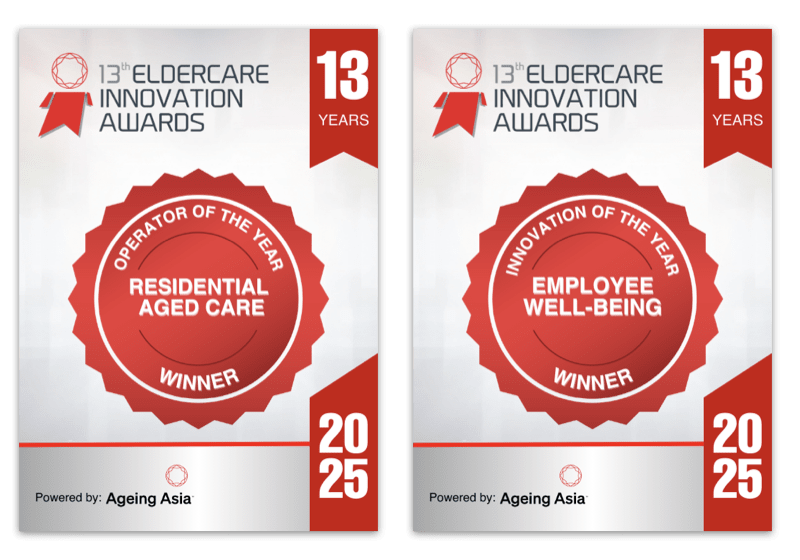
St Andrew's Village Celebrates International Recognition at Prestigious Eldercare Awards
We are delighted to announce that St Andrew’s Village has once again achieved international distinction at the prestigious Ageing Asia Eldercare Innovation Awards in Singapore. Competing against more than 350 organisations from across the Asia Pacific region, St Andrew’s Village was recognised as a finalist in six categories and secured two remarkable wins:
- Operator of the Year – Residential Aged Care
- Excellence in Employee Wellbeing
These accolades underscore our unwavering commitment to excellence in senior care and reflect our continuous innovation in enhancing the quality of life for our residents, staff, and volunteers.
Care Centre
Welcome to the St Andrew's Village Care Centre.
You can browse all the sections of information using the navigation in the green bar at the top and bottom of this page.
Opening Hours
Monday to Friday, 8:30 am to 5pm
Phone 09 585 4020
Visiting Hours
10am through to 7pm
7 days a week
Meal times
Breakfast 7:30am – 8am
Lunch 12pm noon
Dinner 5pm (main meal)
You can also access morning and afternoon tea along with supper snacks served daily.
At St Andrew’s Village, we prepare all our food fresh on-site each and every day. We can also cater to a wide range of special dietary requirements if needed.
Call Bells
Call bells are placed in every room and are easily accessible.
We aim to respond to a call bell within five minutes and monitor the time taken to respond to all calls.
The office and reception desk is located inside the front entrance of the main Care Centre building.
Administration staff can assist residents and family/Whanau with queries regarding accounts, trust accounts and general administration matters. The telephone system runs on “night service” outside of business hours.
More information:

Resident Care Plan
All residential aged care centres are required to maintain accurate and up-to-date records that provide evidence of the quality of care residents receive.
Your Care Plan is part of that process.
It is a working document Designed to provide guidance to all those involved in your daily care and activities. Having an Active Health Care Plan (AHCP) is encouraged and will be discussed during the first few months after admission.
About Your Care Plan
When you are admitted to St Andrew’s, staff will involve you or your representative in numerous assessment activities. Finding out about things that are important to you is part of this process.
All of this information goes into developing Your Care Plan, which is individually tailored to reflect your capabilities, needs and wishes.
Your Care Plan:
Contains details about your medical, physical, social, emotional, lifestyle cultural and spiritual care needs. It outlines how you wish care to be delivered. It can also contain information about family arrangements (e.g. who visits you regularly, emergency contacts and information about Advance Health Care Plan.
Review and update your care plan:
Ask for Your Care Plan to be reviewed and updated whenever you wish to make alterations or amendments.
Updating Your Care Plan (CP):
Care Plans are evaluated regularly and reviewed every 6 months. We will schedule these reviews and involve you and your representative in the process, making sure a printed copy of your Care Plan is available for you to review. Should you wish to have a copy, a summary Care Plan can be made available to you.
You can also request changes to Your Care Plan based on alterations to your preferences. Your nurses, GP/NP and other health care Staff will consult with you to update Your Care Plan when changes are necessary.

Emergency Response
Our trained staff are equipped to handle a range of emergencies. Should an emergency arise, please remain calm and follow instructions from staff.

Wheelchairs & Mobility Equipment
On admission from the community, our Registered Physiotherapist assesses the suitability of your equipment for use at St Andrew’s Village. We will return any unsuitable funded equipment to the supplier. The resident will typically use equipment supplied by St Andrew’s Village.
However, the resident or their family may purchase personal equipment for use. We suggest that if the family is considering purchasing a personal item of equipment they liaise with the Physiotherapist to ensure items fully meet the requirements and needs of the resident. St Andrew’s Village permits electric wheelchairs following an assessment by a registered Physiotherapist.
All electric-powered wheelchairs must be set at a low speed to ensure the safety of all other people who use the Centre.

Pastoral & Spiritual Care Team
St Andrew’s Village has a two-member Pastoral Care Team who care for residents, staff and family/Whanau of any belief or denomination and are available to discuss personal and/or spiritual matters with them.
Please let a staff member know if you would like to talk to a pastoral team member.
Weekly interdenominational services are led on alternating weeks led by Anglican and Presbyterian churches.
Services are held in the Chapel on Thursdays at 1pm.
Other Services Offered
Services, ceremonies and rituals to mark various occasions are led by the Pastoral and Spiritual Care Team.
In addition, we regularly visit residents in their houses and rooms. These visits are a chance to build friendships and to offer support, a listening ear, comfort and prayer if desired. We are also very happy to ‘just be’ with you if that is what is needed. And of course, we are there for residents and their families experiencing times of difficulty or distress.
Our Pastoral Care Team provides a weekly choir workshop and regularly plays the piano in the houses. Special arrangements can also be made for residents to see their own kaumatua, minister, vicar, priest, pastor or elder. Please speak to the staff or the Pastoral and Spiritual Care team.
Room Blessings
Each room is blessed before a new resident enters it and after it has been prepared by staff.
Pastoral and Spiritual Care Team
Phone: (09) 585 4020 ext 257 or 293
Email: pastoralcare@sav.co.nz

Specialist Dementia Care
We have a range of information designed to answer any queries and/or concerns you may have when you or a loved one is considering our specialist memory care unit. Dementia care requires specialised knowledge and approach to care. If a resident requires this level of care it is mandatory to have an active EPOA for care and welfare in place.
Alternatively, they are placed under a temporary mental health order.
We appreciate the significant transition involved when someone moves into a specialist memory care unit. Some people may experience a period of increased confusion until they become accustomed to their new home. It can also be hard for family members. We understand this, and we will do what we can to make the transition as smooth as possible. You are very welcome to talk with our Clinical Manager at any time.
Our locally based GPs and Nurse Practitioner, experienced with people with dementia, will readily consult specialists at Mental Health Services for Older People as required.
We would love to talk with you about what we offer, and how we can work together, and we know you will have more questions than a simple leaflet can answer. Come along and join our “walk through” experience for yourself where you have an opportunity to discuss options and concerns. We will also provide you with the St Andrew’s Village general information brochure.
Our unit staffing is above industry standards, and all Clinical Assistants working in the unit hold a Careerforce Dementia Certificate. In addition, all staff in the unit hold other qualifications relevant to nursing care, ensuring staff are skilled and experienced in this specialist area of care.
Activities and daily events
The Activities staff and volunteers work with the rest of the team to engage residents in meaningful activities aligned with their preferences and routines.
Activities may be group sessions or individually focused. Activities range from bus outings, Inter-Resthome bowls competitions, Intergenerational Kindy Kid visits, pet therapy, arts and crafts and visits to the local café on Roberta Ave.
Families and friends are free to be part of any activity. We will ensure you receive an invitation for any scheduled special events.
Pet visits are encouraged at St Andrew’s Village, and if you would like to bring your pet please discuss this with the team leader.
The displayed activity planners are in each resident’s room, on the House Noticeboard and on “The Street” notice board next to the Chapel outline planned events.

Preventing Falls
St Andrew’s Village takes the resident’s well-being extremely seriously and we have a range of information for residents, family, friends and staff aimed at keeping residents safe and confident.
What activities put you at high risk?
Research tells us that the following activities pose as a high risk for falls:
- Getting in or out of bed
- Going to or from the toilet
- Getting in or out of a chair
- Reaching for things
Why is preventing falls important?
- 40% of falls result in an injury,
- 5% are serious
- Other injuries affect the quality of life
But mainly, they reduce your confidence and sense of well-being.
Things that increase your risk of a fall:
- Research shows us that people at the highest risk of a fall are those who:
- Have had a previous fall
- Are able to stand but need help to transfer
- Have moved to a new home
- Have frequent toileting needs
- Have agitation, confusion, or dementia
- Are taking many medications.
We aim to keep you safe by…
- Helping you get settled into and used to your surroundings
- Assessing your risk of a fall and discussing that with you, your family and other team members, such as the Physiotherapist
- Developing a care plan with you aimed at reducing risk
- Keeping areas uncluttered and removing rugs
- Keeping your call bell within reach and responding to you quickly
- Arranging a sensor mat or any other related equipment, if you can’t call out
- Reacting calmly and confidently should you have a fall, to minimise any extra harm
- Encouraging the use of hip protectors and the consumption of Vitamin D
What you can do:
- If you wish to stand after lying down, sit until you feel steady
- Talk with staff about concerns or ideas about safer mobility
- Ensure your footwear is firm and supportive
- Please consider hip protectors: some falls are not preventable but hip injuries can be
- Tell staff of any hazards
- Participate in as much physical activity as possible
Don’t hesitate to ask for help.
Many people feel they don’t want to “be a nuisance”. Assisting you is what we are here to do.
So… please ring!

X-Rays
When required a portable x-ray can be arranged to take place at St Andrew’s Village, however, the cost of the x-rays is at the expense of the resident unless covered by ACC.
More information:

Resident Care Plan
All residential aged care centres are required to maintain accurate and up-to-date records that provide evidence of the quality of care residents receive.
Your Care Plan is part of that process.
It is a working document Designed to provide guidance to all those involved in your daily care and activities. Having an Active Health Care Plan (AHCP) is encouraged and will be discussed during the first few months after admission.
About Your Care Plan
When you are admitted to St Andrew’s, staff will involve you or your representative in numerous assessment activities. Finding out about things that are important to you is part of this process.
All of this information goes into developing Your Care Plan, which is individually tailored to reflect your capabilities, needs and wishes.
Your Care Plan:
Contains details about your medical, physical, social, emotional, lifestyle cultural and spiritual care needs. It outlines how you wish care to be delivered. It can also contain information about family arrangements (e.g. who visits you regularly, emergency contacts and information about Advance Health Care Plan.
Review and update your care plan:
Ask for Your Care Plan to be reviewed and updated whenever you wish to make alterations or amendments.
Updating Your Care Plan (CP):
Care Plans are evaluated regularly and reviewed every 6 months. We will schedule these reviews and involve you and your representative in the process, making sure a printed copy of your Care Plan is available for you to review. Should you wish to have a copy, a summary Care Plan can be made available to you.
You can also request changes to Your Care Plan based on alterations to your preferences. Your nurses, GP/NP and other health care Staff will consult with you to update Your Care Plan when changes are necessary.

Emergency Response
Our trained staff are equipped to handle a range of emergencies. Should an emergency arise, please remain calm and follow instructions from staff.

Wheelchairs & Mobility Equipment
On admission from the community, our Registered Physiotherapist assesses the suitability of your equipment for use at St Andrew’s Village. We will return any unsuitable funded equipment to the supplier. The resident will typically use equipment supplied by St Andrew’s Village.
However, the resident or their family may purchase personal equipment for use. We suggest that if the family is considering purchasing a personal item of equipment they liaise with the Physiotherapist to ensure items fully meet the requirements and needs of the resident. St Andrew’s Village permits electric wheelchairs following an assessment by a registered Physiotherapist.
All electric-powered wheelchairs must be set at a low speed to ensure the safety of all other people who use the Centre.

Pastoral & Spiritual Care Team
St Andrew’s Village has a two-member Pastoral Care Team who care for residents, staff and family/Whanau of any belief or denomination and are available to discuss personal and/or spiritual matters with them.
Please let a staff member know if you would like to talk to a pastoral team member.
Weekly interdenominational services are led on alternating weeks led by Anglican and Presbyterian churches.
Services are held in the Chapel on Thursdays at 1pm.
Other Services Offered
Services, ceremonies and rituals to mark various occasions are led by the Pastoral and Spiritual Care Team.
In addition, we regularly visit residents in their houses and rooms. These visits are a chance to build friendships and to offer support, a listening ear, comfort and prayer if desired. We are also very happy to ‘just be’ with you if that is what is needed. And of course, we are there for residents and their families experiencing times of difficulty or distress.
Our Pastoral Care Team provides a weekly choir workshop and regularly plays the piano in the houses. Special arrangements can also be made for residents to see their own kaumatua, minister, vicar, priest, pastor or elder. Please speak to the staff or the Pastoral and Spiritual Care team.
Room Blessings
Each room is blessed before a new resident enters it and after it has been prepared by staff.
Pastoral and Spiritual Care Team
Phone: (09) 585 4020 ext 257 or 293
Email: pastoralcare@sav.co.nz

Specialist Dementia Care
We have a range of information designed to answer any queries and/or concerns you may have when you or a loved one is considering our specialist memory care unit. Dementia care requires specialised knowledge and approach to care. If a resident requires this level of care it is mandatory to have an active EPOA for care and welfare in place.
Alternatively, they are placed under a temporary mental health order.
We appreciate the significant transition involved when someone moves into a specialist memory care unit. Some people may experience a period of increased confusion until they become accustomed to their new home. It can also be hard for family members. We understand this, and we will do what we can to make the transition as smooth as possible. You are very welcome to talk with our Clinical Manager at any time.
Our locally based GPs and Nurse Practitioner, experienced with people with dementia, will readily consult specialists at Mental Health Services for Older People as required.
We would love to talk with you about what we offer, and how we can work together, and we know you will have more questions than a simple leaflet can answer. Come along and join our “walk through” experience for yourself where you have an opportunity to discuss options and concerns. We will also provide you with the St Andrew’s Village general information brochure.
Our unit staffing is above industry standards, and all Clinical Assistants working in the unit hold a Careerforce Dementia Certificate. In addition, all staff in the unit hold other qualifications relevant to nursing care, ensuring staff are skilled and experienced in this specialist area of care.
Activities and daily events
The Activities staff and volunteers work with the rest of the team to engage residents in meaningful activities aligned with their preferences and routines.
Activities may be group sessions or individually focused. Activities range from bus outings, Inter-Resthome bowls competitions, Intergenerational Kindy Kid visits, pet therapy, arts and crafts and visits to the local café on Roberta Ave.
Families and friends are free to be part of any activity. We will ensure you receive an invitation for any scheduled special events.
Pet visits are encouraged at St Andrew’s Village, and if you would like to bring your pet please discuss this with the team leader.
The displayed activity planners are in each resident’s room, on the House Noticeboard and on “The Street” notice board next to the Chapel outline planned events.

Restraints
Restraint is the act of preventing a person from moving according to their wishes or imposing other forms of control that limit their actions.
At St Andrew’s Village, we aim for a restraint-free environment wherever possible, and any restraint used must be the least restrictive possible
Restraints are only used as a last resort after all other options have failed, and in a situation where the resident may do something to harm themselves, including loss of dignity.
A decision to use restraint is made in partnership with the resident or their representative, and the team
When might restraint use be considered?
Restraints can help prevent residents from:
- Falling out of bed
- Falling while getting up quickly from a chair
- Mobilising without essential supervision could lead to a fall
- Severely compromising their hygiene or safety needs.
Restraints authorised for use at St Andrew’s Village are:
Bed rails; lap belts; low height for chair or bed; placing a nightingale table in front of a chair; or gentle holding during care, for example: showering.
Other methods which are tried before restraint is proposed
- Talking with the resident and their family about their care and activity needs
- Having a family member or volunteer spend time with the resident
- Using sensor mats to alert staff to a resident’s movements
- Creating a tranquil or interesting environment
- Providing activities to draw attention away from actions which may cause harm to the resident or others
- Reviewing pain control
- Additional efforts to ensure comfort.
Are there risks associated with using restraints?
Yes, which is why they are considered only as a last resort with full discussion with residents and their families, the GP/NP and the Clinical Team.
Depending on the type of restraint being considered, risks can include: loss of dignity (always a risk); falling over bed rails’ entrapment; skin tears and bruising; immobility and its consequences; frustration or aggression.
When are restraints removed?
Restraints must be released at 2 hourly intervals throughout each day.

Preventing Falls
St Andrew’s Village takes the resident’s well-being extremely seriously and we have a range of information for residents, family, friends and staff aimed at keeping residents safe and confident.
What activities put you at high risk?
Research tells us that the following activities pose as a high risk for falls:
- Getting in or out of bed
- Going to or from the toilet
- Getting in or out of a chair
- Reaching for things
Why is preventing falls important?
- 40% of falls result in an injury,
- 5% are serious
- Other injuries affect the quality of life
But mainly, they reduce your confidence and sense of well-being.
Things that increase your risk of a fall:
- Research shows us that people at the highest risk of a fall are those who:
- Have had a previous fall
- Are able to stand but need help to transfer
- Have moved to a new home
- Have frequent toileting needs
- Have agitation, confusion, or dementia
- Are taking many medications.
We aim to keep you safe by…
- Helping you get settled into and used to your surroundings
- Assessing your risk of a fall and discussing that with you, your family and other team members, such as the Physiotherapist
- Developing a care plan with you aimed at reducing risk
- Keeping areas uncluttered and removing rugs
- Keeping your call bell within reach and responding to you quickly
- Arranging a sensor mat or any other related equipment, if you can’t call out
- Reacting calmly and confidently should you have a fall, to minimise any extra harm
- Encouraging the use of hip protectors and the consumption of Vitamin D
What you can do:
- If you wish to stand after lying down, sit until you feel steady
- Talk with staff about concerns or ideas about safer mobility
- Ensure your footwear is firm and supportive
- Please consider hip protectors: some falls are not preventable but hip injuries can be
- Tell staff of any hazards
- Participate in as much physical activity as possible
Don’t hesitate to ask for help.
Many people feel they don’t want to “be a nuisance”. Assisting you is what we are here to do.
So… please ring!

Bedrails
If a resident is not able to remove a rail themselves or is unable to ask for it to be removed, then it is deemed to be a restraint; and as such, a full restraint assessment and consent process must be followed.
What are the risks?
- Loss of freedom, independence and choice
- Falls from climbing over the side of the bed
- Fractures/death from such falls
- Fractures from entangling legs between uncovered bed rails.
- Entrapment (limb, head or neck caught between bars).
What are the benefits of using bed rails?
- Enhanced bed mobility
- Feeling of safety
- Residents who request rails can use them as aids for comfort or mobility
How are decisions made?
Decisions are made by the Clinical Team (nursing and medical staff), and sometimes the Physiotherapist, in partnership with the resident and their family.
They weigh up the benefits and risks, and also whether or not the use of a bed rail will be a restraint.

X-Rays
When required a portable x-ray can be arranged to take place at St Andrew’s Village, however, the cost of the x-rays is at the expense of the resident unless covered by ACC.

Personal Fridge
You can speak with the Clinical Manager for permission if a personal fridge is required.
Please note, there is a set criteria to meet for approval.
Admission To Care
Find information regarding administration aspects of St Andrew's Village.
You can browse all the sections of information using the navigation in the green bar at the top and bottom of this page.
Location and Hours
The office and reception desk is located inside the front entrance of the main Care Centre building.
Administration staff are available to assist residents and family/whanau with queries regarding accounts, trust accounts and general administration matters. Outside of Business hours, the telephone system runs on “night service”.
Opening Hours are Monday to Friday, 8:30 am to 5:00 pm Phone 09 585 4020.
Suggestion Forms
We welcome your feedback; suggestion forms are located at Reception and placed in the red Pillar Box in “The Street” once completed.
You can also fill them out online by selecting from the links below.
Do you have a compliment, concern or complaint?
Would you like to nominate a staff member for an excellence award?
Admissions
The Admissions Manager deals with all aspects of the admission process. Your Admission Agreement sets out the terms of residency and the agreed services we will provide for your personal care and well-being. All prospective residents are encouraged to have an Enduring Power of Attorney for both Health & Welfare and Property & Finance.
More information:
Residents’ Rights
We have included a Code of Rights pamphlet from the Health & Disability Commissioner in your admission pack.
In summary, it states:
- You should be treated with respect.
- No one should discriminate against you, pressure you into anything or take advantage of you.
- Services should help you live a dignified, independent life.
- You should be treated with care and skill and receive well-co-ordinated services of a good standard.
- Service providers should listen to you and give you the information in a way you can understand and that makes you comfortable to ask questions if you do not understand.
- You should have your condition explained to you, including benefits, risks, alternatives and costs of treatment and have any questions answered honestly.
- You can make your own decisions and are free to change your mind.
- You can have a support person with you at most times.
All these rights apply when asked to take part in research or teaching. Your right to make a complaint about services is taken seriously.
Fees
If you are not eligible for a financial subsidy from Health of Older People – Te Toka Tumai Auckland and Waitematā District, you will be responsible for the payment of your fees. St Andrews will invoice your fees at the end of each calendar month, payable immediately. You can process your payment by either direct debit or automatic payment; contact the Accounts officer for details.
When assessed as needing Private Hospital or Dementia Care, you are entitled to receive a partial top-up subsidy.
If you are eligible for a full subsidy, the Ministry of Health will pay St Andrews on your behalf. Incidentals are not covered by the subsidy, so will need to be covered by the Resident / Family.
You need to have your Superannuation redirected to St Andrew’s Village, otherwise the shortfall charges will reflect monthly on your account. You will still receive the personal allowance portion of your Superannuation paid directly to a bank account of your choice or alternatively, you could request a deposit into your Trust Account operated by St Andrew’s Village.
We require the initial cost of care to be paid in advance, after which an account is produced at the end of each calendar month and becomes immediately due for payment. Payment can be by either eftpos or automatic payment. Please contact the main office for details.
Trust Account
It is not advisable to keep large amounts of money on your person or in your room. Residents can open a trust account at reception to pay for services such as hairdressing, podiatry, transport money, pocket money and shop items. The Accounts team will send you monthly statements. Please keep your cash and credit cards in a locked cupboard.
Enduring Power of Attorney (EPOA)
All prospective residents are encouraged to have an Enduring Power of Attorney for both Health & Welfare and Property & Finance for which we require copies. This is especially important if you become unable to make decisions with regard to your health & welfare or business and financial matters on a temporary or permanent basis. Information is available via the St Andrews Admissions Manager, Public Trust, Guardian Trust or your Solicitor. Please note that St Andrews requires a copy of the EPOA documentation on your file if one has been appointed.
Witnessing of Wills & Documents
St Andrew’s Village Staff are not authorised to witness wills or legal documents. The resident’s solicitor or family/whanau need to arrange appointments with the Justices of the Peace or independent witnesses. Our Director of Care can witness documents under special circumstances. For any further information please contact the Admissions Manager if you need assistance.
Privacy
We provide ‘Do Not Disturb’ door signs on request and doors are fitted with locks should you wish to limit access to your room. There are small family rooms available for your use if you want a private space to interact with your friends and family. Staff respect residents’ privacy.
Electronic Key Tag
An electronic key tag will be issued during your admission process. Replacement key tags will incur an additional charge. Your room will always remain locked if you are absent from St Andrew’s Village. Our senior team members hold a master all-access electronic key tag in case of an emergency that necessitates room access. If you need any assistance with access requirements please get in touch with the Nurse Manager.
Personal Property & Valuables
As per the admission agreement, “We are not responsible for any money, bankcards, jewellery or valuables held by you at St Andrew’s Village. We recommend that you do not keep unsecured valuables at St Andrew’s Village”
St Andrew’s Village does not provide insurance coverage for your personal effects. However, we take all reasonable steps to trace lost items. If the property is missing, please report this to a senior staff member as soon as possible. Personal effects include dentures, eyeglasses, hearing aids, prostheses, razors, jewellery, ornaments etc.
You need to arrange private insurance. For your own peace of mind, please restrict the amount of cash you have in your possession. We advise residents to set up a St Andrew’s Village Trust Account for the safekeeping of their money and to place valuables in a lockable drawer. We suggest residents lock the door when not in their room. You can request a key tag for your room through your Nurse Manager. A locked safe is also available upon request.
Insurance
St Andrews does not have insurance coverage that covers residents’ personal effects. We encourage you to arrange private insurance if needed.
We are not responsible for any money, bankcards, jewellery or valuables held by you at St Andrew’s Village. We recommend that you do not keep unsecured valuables at St Andrew’s Village
Change of Address – Next of Kin
It is important that your contact details are kept in a current state. If your next of kin (NOK) has a change of address, email or phone/mobile number, please advise one of the nursing staff.
Electoral Role
The NZ Post Office will advise the Registrar of Electors of your new address when you have completed the Mail Redirection form available from NZ Post. The local electoral office will visit prior to an election to collect special votes.
Gold Card
A Community Services or Gold Card entitles you to subsidies and health-related services. However, the subsidies and services are needs and assets based. Once you are a resident at St Andrew’s Village Care Centre, if you are entitled to a card, we will assist you in applying for and/or renewing it.
More information:
Residents’ Rights
We have included a Code of Rights pamphlet from the Health & Disability Commissioner in your admission pack.
In summary, it states:
- You should be treated with respect.
- No one should discriminate against you, pressure you into anything or take advantage of you.
- Services should help you live a dignified, independent life.
- You should be treated with care and skill and receive well-co-ordinated services of a good standard.
- Service providers should listen to you and give you the information in a way you can understand and that makes you comfortable to ask questions if you do not understand.
- You should have your condition explained to you, including benefits, risks, alternatives and costs of treatment and have any questions answered honestly.
- You can make your own decisions and are free to change your mind.
- You can have a support person with you at most times.
All these rights apply when asked to take part in research or teaching. Your right to make a complaint about services is taken seriously.
Fees
If you are not eligible for a financial subsidy from Health of Older People – Te Toka Tumai Auckland and Waitematā District, you will be responsible for the payment of your fees. St Andrews will invoice your fees at the end of each calendar month, payable immediately. You can process your payment by either direct debit or automatic payment; contact the Accounts officer for details.
When assessed as needing Private Hospital or Dementia Care, you are entitled to receive a partial top-up subsidy.
If you are eligible for a full subsidy, the Ministry of Health will pay St Andrews on your behalf. Incidentals are not covered by the subsidy, so will need to be covered by the Resident / Family.
You need to have your Superannuation redirected to St Andrew’s Village, otherwise the shortfall charges will reflect monthly on your account. You will still receive the personal allowance portion of your Superannuation paid directly to a bank account of your choice or alternatively, you could request a deposit into your Trust Account operated by St Andrew’s Village.
We require the initial cost of care to be paid in advance, after which an account is produced at the end of each calendar month and becomes immediately due for payment. Payment can be by either eftpos or automatic payment. Please contact the main office for details.
Trust Account
It is not advisable to keep large amounts of money on your person or in your room. Residents can open a trust account at reception to pay for services such as hairdressing, podiatry, transport money, pocket money and shop items. The Accounts team will send you monthly statements. Please keep your cash and credit cards in a locked cupboard.
Enduring Power of Attorney (EPOA)
All prospective residents are encouraged to have an Enduring Power of Attorney for both Health & Welfare and Property & Finance for which we require copies. This is especially important if you become unable to make decisions with regard to your health & welfare or business and financial matters on a temporary or permanent basis. Information is available via the St Andrews Admissions Manager, Public Trust, Guardian Trust or your Solicitor. Please note that St Andrews requires a copy of the EPOA documentation on your file if one has been appointed.
Witnessing of Wills & Documents
St Andrew’s Village Staff are not authorised to witness wills or legal documents. The resident’s solicitor or family/whanau need to arrange appointments with the Justices of the Peace or independent witnesses. Our Director of Care can witness documents under special circumstances. For any further information please contact the Admissions Manager if you need assistance.
Privacy
We provide ‘Do Not Disturb’ door signs on request and doors are fitted with locks should you wish to limit access to your room. There are small family rooms available for your use if you want a private space to interact with your friends and family. Staff respect residents’ privacy.
Electronic Key Tag
An electronic key tag will be issued during your admission process. Replacement key tags will incur an additional charge. Your room will always remain locked if you are absent from St Andrew’s Village. Our senior team members hold a master all-access electronic key tag in case of an emergency that necessitates room access. If you need any assistance with access requirements please get in touch with the Nurse Manager.
Personal Property & Valuables
As per the admission agreement, “We are not responsible for any money, bankcards, jewellery or valuables held by you at St Andrew’s Village. We recommend that you do not keep unsecured valuables at St Andrew’s Village”
St Andrew’s Village does not provide insurance coverage for your personal effects. However, we take all reasonable steps to trace lost items. If the property is missing, please report this to a senior staff member as soon as possible. Personal effects include dentures, eyeglasses, hearing aids, prostheses, razors, jewellery, ornaments etc.
You need to arrange private insurance. For your own peace of mind, please restrict the amount of cash you have in your possession. We advise residents to set up a St Andrew’s Village Trust Account for the safekeeping of their money and to place valuables in a lockable drawer. We suggest residents lock the door when not in their room. You can request a key tag for your room through your Nurse Manager. A locked safe is also available upon request.
Insurance
St Andrews does not have insurance coverage that covers residents’ personal effects. We encourage you to arrange private insurance if needed.
We are not responsible for any money, bankcards, jewellery or valuables held by you at St Andrew’s Village. We recommend that you do not keep unsecured valuables at St Andrew’s Village
Change of Address – Next of Kin
It is important that your contact details are kept in a current state. If your next of kin (NOK) has a change of address, email or phone/mobile number, please advise one of the nursing staff.
Electoral Role
The NZ Post Office will advise the Registrar of Electors of your new address when you have completed the Mail Redirection form available from NZ Post. The local electoral office will visit prior to an election to collect special votes.
Gold Card
A Community Services or Gold Card entitles you to subsidies and health-related services. However, the subsidies and services are needs and assets based. Once you are a resident at St Andrew’s Village Care Centre, if you are entitled to a card, we will assist you in applying for and/or renewing it.

